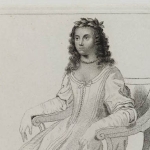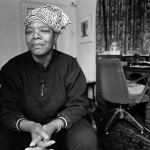In Jinotega women greeted us
with thousands of flowers roses
it was hard to tell the petals
on our faces and arms falling
then embraces and the Spanish language
which is a little like a descent of
petals pink and orange
Suddenly out of the hallway our
gathering place AMNLAE the
Asociación de Mujeres women
came running seat yourselves dear
guests from the north we announce
a play a dance a play the women
their faces mountain river Indian
European Spanish dark-haired
women
dance in gray-green
fatigues they dance the Contra who
circles the village waiting
for the young teacher the health worker
(these are the strategies) the farmer
in the high village walks out into the
morning toward the front which is a
circle of terror
they dance
the work of women and men they dance
the plowing of the fields they kneel
to the harrowing with the machetes they
dance the sowing of seed (which is always
a dance) and the ripening of corn the
flowers of grain they dance the harvest
they raise their machetes for
the harvest the machetes are high
but no!
out of the hallway in green and gray
come those who dance the stealth
of the Contra cruelly they
dance the ambush the slaughter of
the farmer they are the death dancers
who found the schoolteacher they caught
the boy who dancing brought seeds in
his hat all the way from Matagalpa they
dance the death of the mother the
dance the child murdered the seeds
spilled and trampled they dance
sorrow sorrow
they dance the
search for the Contra and the defeat
they dance a comic dance they make a
joke of the puppetry of the Contra of
Uncle Sam who is the handler of puppets
they dance rage and revenge they place
the dead child (the real sleeping baby)
on two chairs which is the bier for
the little actor they dance prayer
bereavement sorrow they mourn
Is there applause for such theater?
Silence then come let us dance
together now you know the usual
dance of couples Spanish or North
American let us dance in twos and
threes let us make little circles let us
dance as though at a festival or in peace-
time together and alone whirling stamping
our feet bowing to one another
the children
gather petals from the floor to throw
at our knees we dance the children
too banging into us into each other and
one small boy dances alone pulling
at our skirts wait he screams stop!
he tugs at the strap of our camera Stop!
stop dancing I’m Carlos take a picture
of me No! Now! Right now! because
soon Look! See Pepe! even tomorrow
I could be dead like him
the music
catches its breath the music
jumping in the guitar and phonograph holds
still and waits no no we say Carlos
not you we put our fingers on his little
shoulder we touch his hair but one of
us is afraid for god’s sake take his
picture so we lift him up we photo-
graph him we pass him from one to
another we photograph him again and
again with each of us crying or
laughing with him in our arms
we dance



















Comment form: